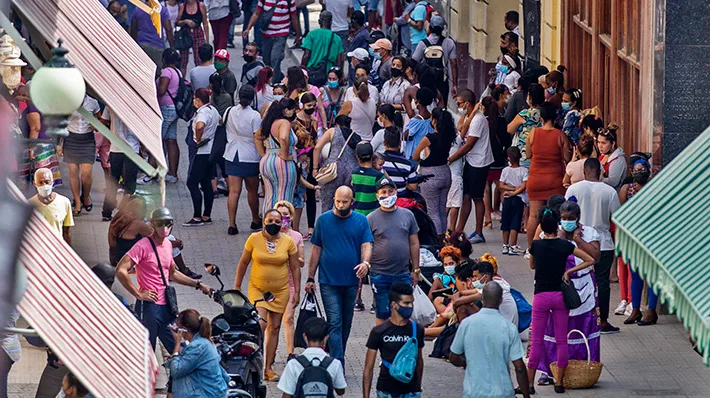
Retail prices
“Damn it!” he said after parking his motorcycle in the space he found in front of the Immigration office on 17th and J in the Vedado neighborhood of Havana. “The queue is long,” I commented. But apparently he’s not here to get a passport or renew it, but to line up for his parents, and when it’s their turn, he’ll call them. He stands in line and looks for a patch of shade under a tree. We talk.
His parents are in their sixties and no longer up to the task of long waits and the hustle and bustle one faces for travel, “but to buy food — that’s a hassle.” Food difficulties are a trigger for these queues, not the only one, but they certainly weigh heavy on his mind set: “It determines what we put on the dinner table,” he notes.
“Look,” he says, “now things are going to get more difficult.” He’s referencing the government’s decision to fix prices to retail standards for a series of products, except for those officially understood as essential and which are published in Cubadebate.
He is right. The news has surprisingly motivated people to opine in the national media and on social networks where they comment on daily events. One can gauge what people are thinking and feeling there. An example of opinions on these networks is the note published on his Facebook page by the well-know Cuban economics professor Oscar Fernández:
“Can someone explain to me how this makes sense at this time: that the “heads of chain stores and other entities have been empowered to approve retail prices in Cuban pesos?
“Can any public servant explain how this measure makes sense in an anti-inflationary program? Or how it stimulates supply? Or how it drives structural transformation?
“One of the last instruments left to the State in order to influence retail prices throughout the economy has just been turned over to ‘store owners.’ How many are chain stores? Do they compete, or are they subordinate to a very few bosses? Who are those bosses? Are they public servants? Do they appear at least in the Round Table TV program explaining what they’re doing?
“This has nothing to do with the autonomy businesses need. This, among many other things, must be explained transparently. Or there will be no going back.”
Another economist, Mauricio de Miranda Parrondo, in his article published in La Joven Cuba, believes that “the Cuban economic authorities, (…) persist in addressing the problems of the economy from circulation, without making structural changes that lead to an increase in production. In this way they are not going to achieve positive results.”
And he adds, “ Freeing retail prices in conditions of severe supply shortages is fueling inflation, already considerably high.”
The man on the motorcycle, a food delivery person not working today, tells me: “Today I’m dedicating my time to the old folks,” while typing furiously on his smart phone. “I read everything, the same from here, from there… look at him,” he tells me, pointing at the phone screen, “the chain stores will most certainly raise prices.” Lending support to his opinion, he shows me and then texts me the commentary on the opinions of readers published by the Ministry of Finance and Prices (MFP) in Cubadebate.
The key, according to him, resides in the increase in prices in the international market, the complexity of obtaining financing, and the increase in freight costs. “That goes against our pocketbook,” he pauses, and adds: “It’s clear to me, prices will be raised by the stores, not the government,” and smirks. And he keeps typing…

